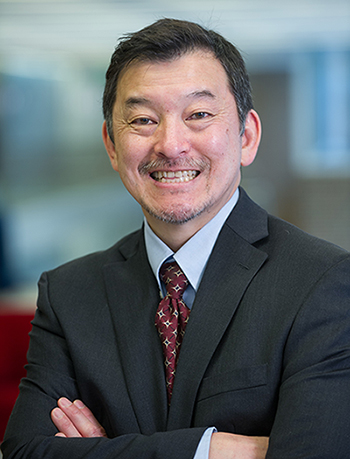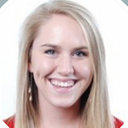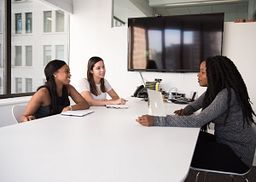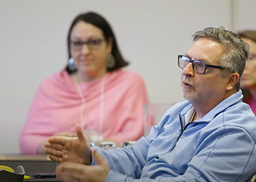Darin Ryujin: On A Lifelong Journey for Justice

Associate Professor and the Director of Inclusion and Diversity at the University of Utah Physician Assistant Program and Associate Chair for Equity, Diversity and Inclusion in the Department of Family and Preventive Medicine, Darin Ryujin, MS, MPAS, PA-C, graduated as a physician assistant 18 years ago. Seven months later, he was hired at the University of Utah to work in diversity, equity, and inclusion outreach. Since then, he has dedicated his career to striving toward equity and inclusion, and has offered PAEA his expertise as a Diversity and Inclusion Mission Advancement Commission (DIMAC) volunteer. Read our conversation with Darin to learn about his career, what he is most proud of, and the advice he would give to his younger self today.
Tell us about your diversity, equity, and inclusion work at the University of Utah:
We’re collaborating with incredible faculty members and have created very intentional programs and a mission that is explicit around diversity, equity, and inclusion (DEI) work and health disparities, looking at historical discrimination around higher education and asking how we combat that in a PA program. We’ve had a holistic review for some time now, and our upcoming class is 52% BIPOC and 29% URIM. Our compositional diversity for the PA program meets or exceeds the population parity for Utah.
We’re also working to help student retention and persistence – not just looking at metrics but approaching each student individually. There are all kinds of social determinants of education, and there’s a difference between those who have privilege and who don’t. It’s not as simple as, “you’re doing well,” or “you’re failing.” We look at all the intersections of someone’s identity rather than just telling them to learn how to study. We are an equity-based program, meaning that we give every student what they need so they all have the same support. The University of Utah offers everything from a Women’s Center, to LGBTQIA resources, a veteran center, multicultural counseling, and probably 40 other resources. Everything we do now, from admissions to curriculum, has to support the mission and our equity model.
Why are representation and visibility so critical in education?
We all know that you don’t join anything unless you feel like you’re going to fit in some way and in some intersection of your identity. And if we look at the overall diversity of the PA profession and education, there are not very many people color. For a while, there were very few PA faculty across the country doing DEI work as their primary charge, possibly because it takes funding and commitment to do it. But for BIPOC students, seeing organizations put their “money where their mouth is” shows them that it’s a priority and valued. It’s important to put people in this position, give them this charge, support them and pay them like you would pay any other faculty member.
Equity, diversity and inclusion, visibility, and representation must be interwoven into everything – in the curriculum, admissions, the hiring, and the climate. Students of color are not going to go where they don’t think they’re going to be welcomed and where they don’t have any sense of belonging, and that’s why there needs to be representation. And as we increase our student body diversity, then we begin reaching communities who have been medically and socially marginalized for hundreds of years.
Why is AAPI Heritage Month significant to you?
I’m a fourth generation Japanese American, meaning my family has been here over 130 years. The Asian American diaspora is huge and the intersections within there are huge, but we’re often all lumped into the “Asian American” category. Being in a family who started here way before civil rights and underwent things like the Chinese Exclusion Act, Yellow Peril, and the Japanese and American internment, I’m very proud of where we came from.
I believe Asian American and Pacific Islander Heritage Month is an important time to say that we need to have voice, we all need to be on the same page, and we need to be with all the other marginalized groups in this movement towards, justice, peace and equity. People don’t realize that Asians have been targeted forever. I remember this happening when I was a young kid, and people doing things and patients saying things to me even as recently as within the last year. We’re all having these experiences, but culturally, we just don’t say very much. Now we are speaking up, which is something that I feel very feel strongly about. From an Asian American male perspective, we’ve been told not to get involved and be quiet and hope that everything will turn out okay, but we can’t do that anymore because now we’re dying. I look at all our family went through and what other Asian people are going through now, and it’s a big deal for me. We all have a story to tell, and the cool thing is that we’re all different. It’s time that Asians start telling our stories, because this is real, right now – here’s our chance.
What advice would you give to your younger self?
As humans, we want to belong. DEI was important to me at a very young age. I would say “if you really are passionate about this, and this is what you want to do, and this is what you want to be known for when you die, then you can’t be complicit just because you want to be liked.” As a DEI officer, I have to do the right thing, and people are going to push back. You can’t worry about that, especially in higher education. Mentors have told me that if someone doesn’t like what you’re doing in the DEI space, it probably means you’re doing the right thing. But I would help my younger self feel a little bit stronger around that, not be too fearful, and to have some confidence in myself – that I can do this work. I think if I had confidence in my own voice, I may have gotten to where I am faster.
What are you most proud of in your career?
I am most proud of being able to help create a program that invites in diversity and supports it. It’s special to work with faculty who embrace this mission, seeing that we all come from different worlds and different constructs, with different levels of privilege, but we’re still on that same page. Seeing the same students that I’ve worked with since they were in high school getting into and completing the program, then going back to care for underserved communities, is an amazing feeling. Many of them have been told they’re not supposed to “make it,” but they can and they do, even though the odds are against them. We have students who come in from all over the country to be in our program because they see what we’re doing in the DEI space, so I’m pretty proud of that.




